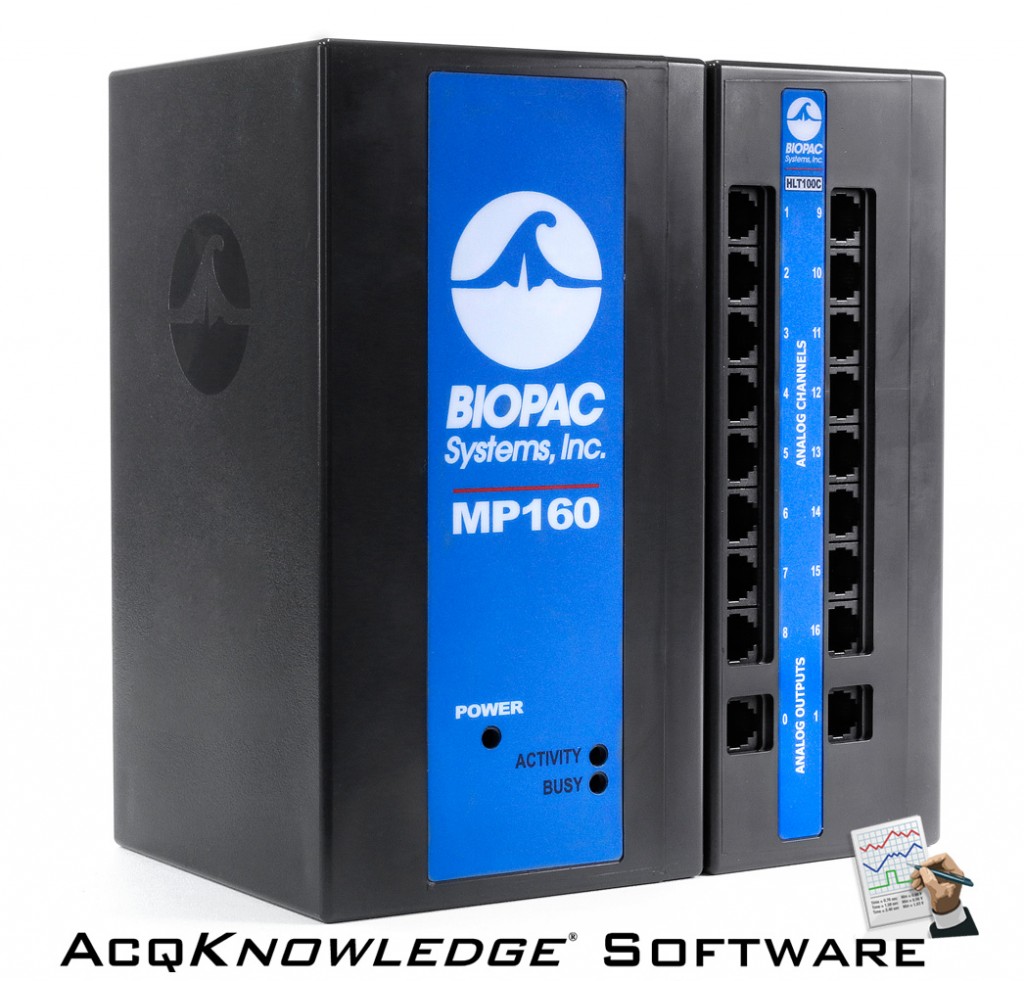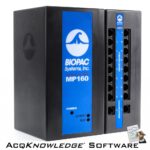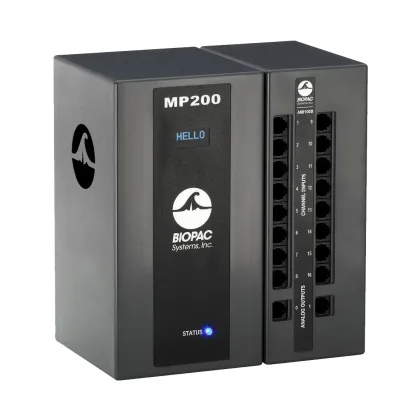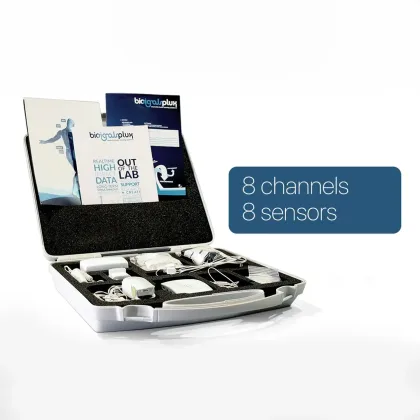BIOPAC MP160 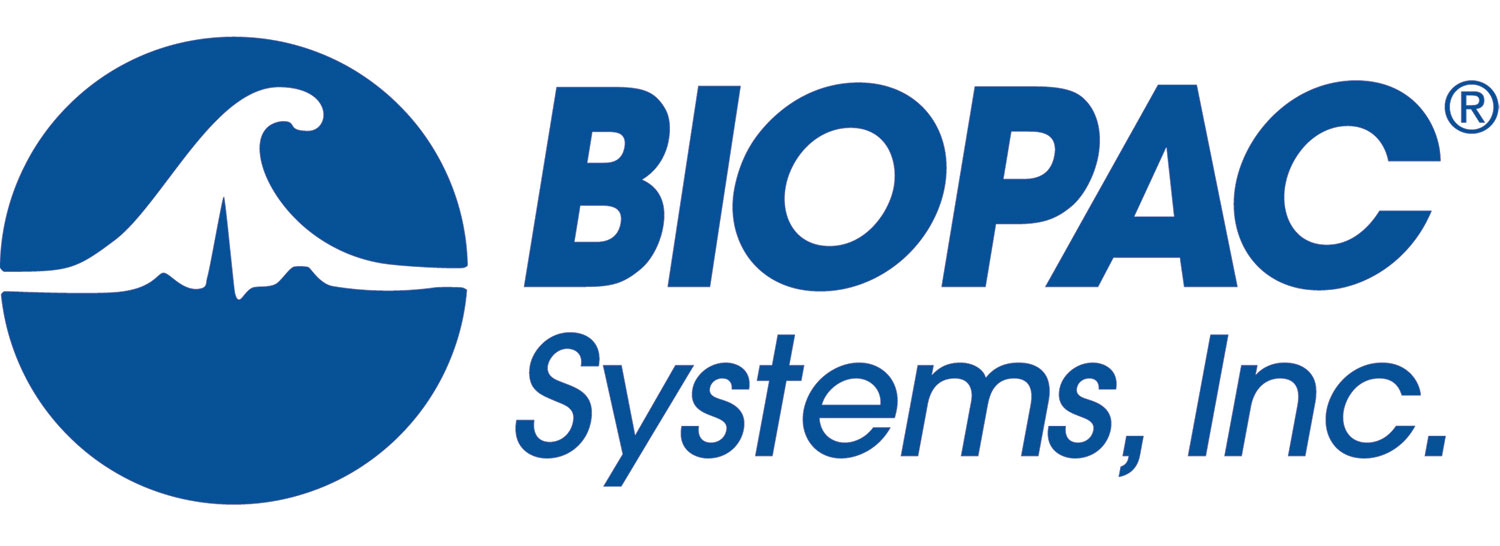
BIOPAC Systems are used in thousands of research labs around the world. 99% of the world’s top universities run BIOPAC systems, and BIOPAC systems are cited in over 45,700 peer-reviewed journal articles & scholarly references.
The BIOPAC MP160 system is a flexible, proven modular data acquisition & analysis system for life science research. This 16-channel system includes AcqKnowledge software with specialized analysis capabilities. Applicable to over 40 research fields, new modules are available for electrogastrogram, micro-electrode recording, noninvasive blood pressure measurement & electrical bioimpedence (cardiac output), and others. To facilitate the discovery process and help ensure reproducible, publishable data, powerful automated analysis routines are available for ECG, HRV, EEG, EMG, EGG, and many more.
HOW TO CHOOSE THE BEST DAQ SYSTEM FOR YOUR LAB
The MP160 offers multiple configurations to suit individual research and teaching needs and records multiple channels with differing sample rates at speeds up to 400 kHz (aggregate). MP160 systems are Ethernet-ready and compatible with BIOPAC system components as well as many leading equipment brands and supports a wide range of wireless & wired signal-specific amplifiers. Used in conjunction with AcqKnowledge software and BIOPAC electrodes, amplifiers, transducers and other system components, the MP160 is part of a complete data acquisition & analysis system. Multiple MP160 systems easily interface with the same computer and a single copy of AcqKnowledge software when more than 16 channels of data is a necessity. The MP160 features fast, simple setup and is approved for human and animal research.
MP160 with AcqKnowledge 5 is the newest addition to the MP Research System line, and is functionally equivalent to the MP150 device it replaces. The MP160 and AcqKnowledge 5 combination provides a powerful tool for life science research and features enhancements including improved signal quality, an auto-sensing Ethernet port, lower power consumption, an eco-friendly design, and more. The MP160 unit ships with a HLT100C High level transducer module.
When to chose MP160
- Need a wired system
- Need more than 3 transmitter / 9 channels
- Need up to 400 kHz
- Need MRI, ERS, 02 Gas Analysis, Pulse Oximetry, Laser Doppler Flowmetry, Micro Electrode
- Need to connect to 3rd party hardware
- Need stimulation setup in software
- Need triggering in software
- Need averaging data acquisition option
- Need variable rate sampling
Alternative MP Research Systems: MP36R 4-Channel Systems with built-in universal amplifiers to record a wide range of physiological signals.
Specifications
| Analog Inputs | |
|---|---|
| Number of Channels | 16 |
| Absolute Maximum Input | ±15 V |
| Operational Input Voltage | ±10 V |
| A/D Resolution | 16 Bits |
| Accuracy (% of FSR) | ±0.003 |
| Input impedance | 1.0 MΩ |
| Analog Outputs | |
| Number of Channels | 2 |
| Max output with acquisition | 2 channels |
| Output Voltage Range | ±10 V |
| D/A Resolution | 16 bits |
| Accuracy (% of FSR) | ±0.003 |
| Output Drive Current | ±5 mA (max) |
| Output Impedance | 100 Ω |
| Digital I/O* | |
| Number of Channels | 16 |
| Voltage Levels | TTL, CMOS |
| External Trigger Input | TTL, CMOS compatible – See also: External Trigger Inputs |
| Time Base | |
| Min Sample Rate | 2 samples/hour |
| Trigger Options | Internal, External or Signal Level |
| Power | |
| Amplifier Module Isolation | Provided by the MP unit, isolated clean power |
| CE Marking | EC Low Voltage and EMC Directives |
| Leakage current | <8 µA (Normal), <400 µA (Single Fault) |
| Fuse | 2 A (fast blow) |
| Device Specs | |
| Max Sample Rate / MP Internal Memory | 200 K samples/sec (400 K aggregate) |
| PC Memory/Disk | PC Memory/Disk: 200 K samples/sec (400 K aggregate) |
| Waveform Output Buffer | 500 K samples |
| Serial Interface Type/Rate | Ethernet: UDP (10M bits/sec) |
| Transmission Type | Ethernet |
| Maximum cable length | 100 meters (Ethernet cable) |
| Power Requirements | 12 VDC @ 2 amp (uses AC150A) |
| Dimensions | 10 cm x 11 cm x 19 cm |
Latest citations of iMotions and “BIOPAC MP160” by Biopac
Related Research
Guides to iMotions
Publications
Read publications made possible with iMotions
Blog
Get inspired and learn more from our expert content writers
Newsletter
A monthly close up of latest product and research news


